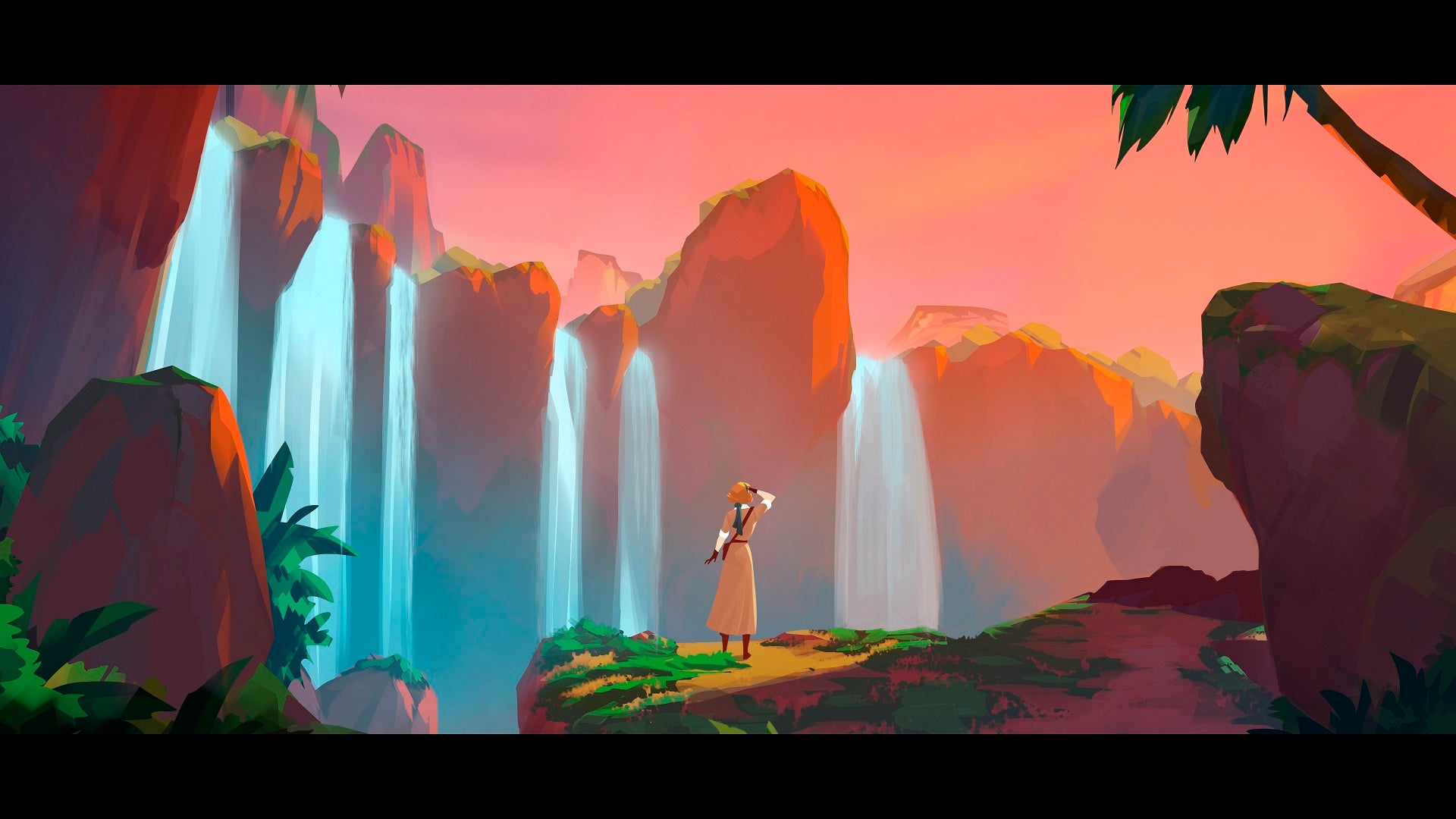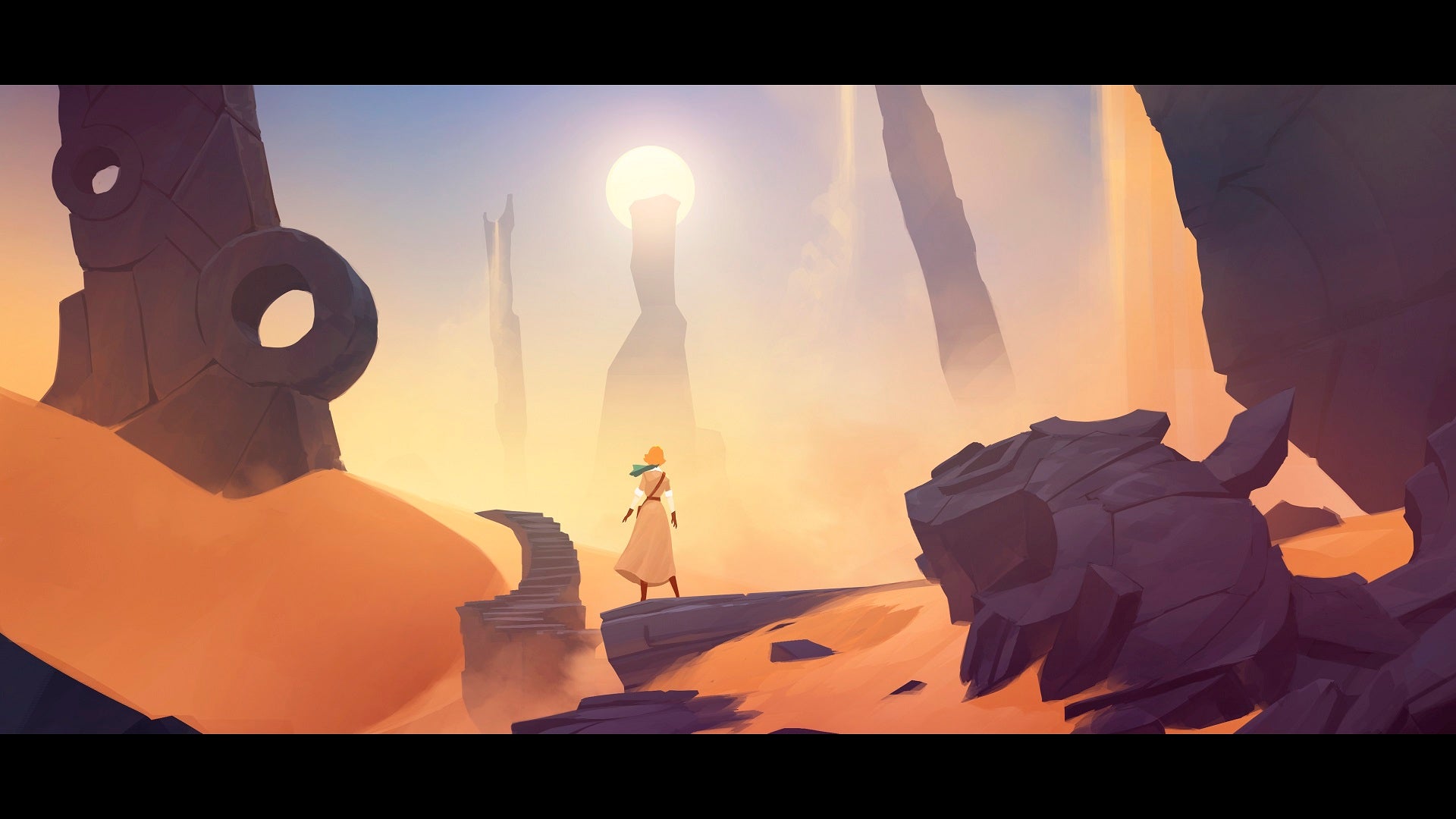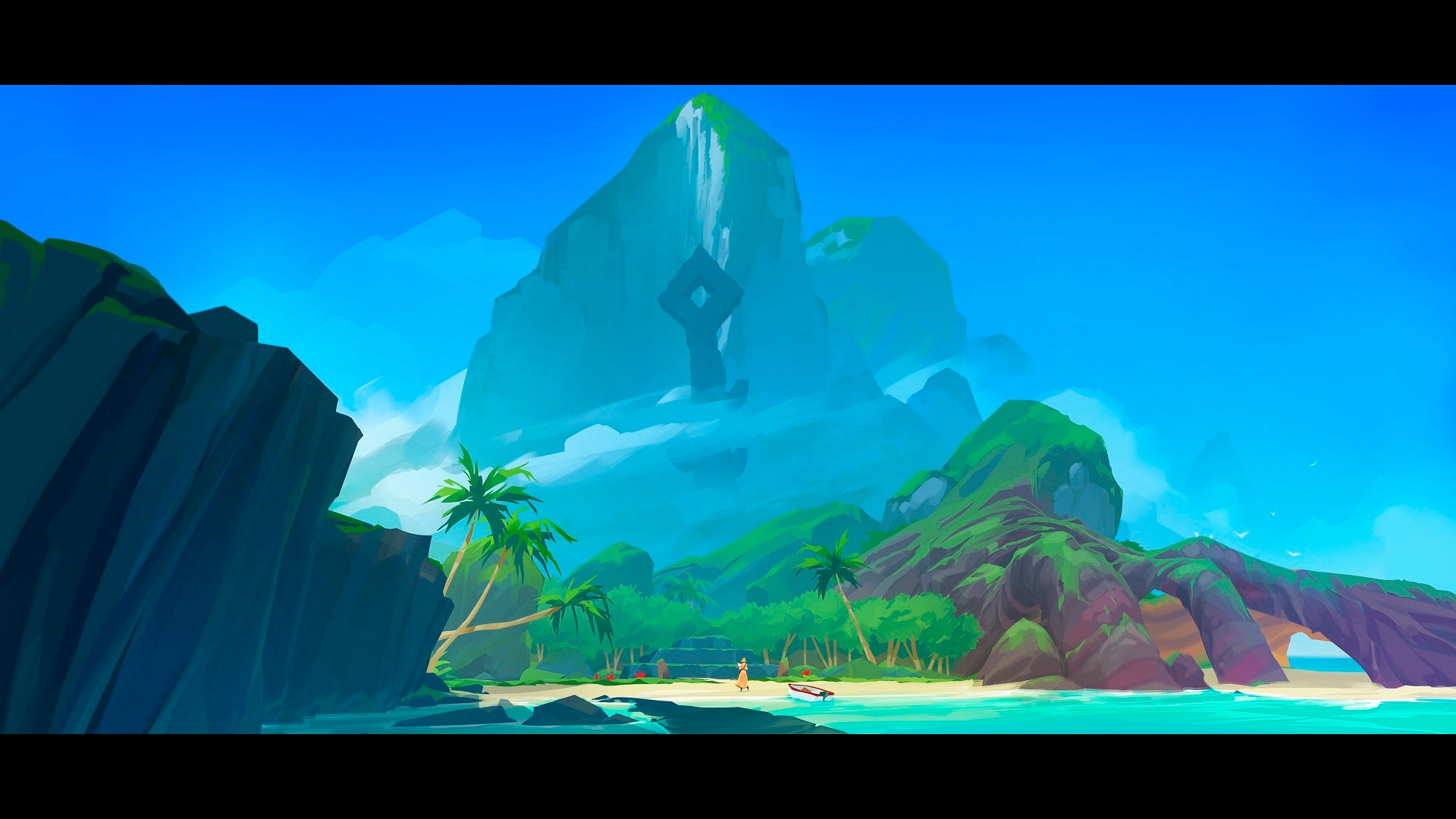And the more I read about Call of the Sea, the more remarkable it seems. It is the debut game by a Spanish studio called Out of the Blue Games (appropriately), and it was made in only a year-and-a-half. For a game to be built so assuredly in such a short space of time, by a new studio, is very impressive. Intrigued, I tracked down studio co-founder and Call of the Sea game director, Tatiana Delgado, for a chat. Hello! How are you? How are things over in Madrid? Tatiana Delgado: Well, it’s almost a year since Covid is started, so we are at home still and we’re good. We now are enjoying the release of the game and all the good reception we are getting. I’m very fond of your game. It was one of my favourite games of last year. And you’ve just been nominated for a BAFTA- Tatiana Delgado: Yeah! Wow, that was amazing. We cannot believe it. It’s… wow. [laughs] You’re nominated for Best Debut. So who are Out of the Blue Games? You founded the studio, is that correct? Tatiana Delgado: Yes. I have a business partner that is Manuel Fernandez, [and] we’ve been in the games industry for, I think, eighteen years. The average experience in this studio is more than ten years, so we have been working a lot of years in the gaming industry. And we have learned how, mostly, not to do things. We have been seeing so many mistakes being done in other companies. That’s why we were really very focused in production. We wanted to do a strong pre-production. We set the goals for the game and we tried to follow everything until the end, so we didn’t add anything crazy at the middle, or change systems. […] Everybody knew what they had to do. We trusted a lot in the team. We wanted to give the team the chance to do what they really wanted to: to put their soul in the game. And I think everybody was so invested in the game that they put so much passion [in], [and it] is something that you actually can feel when you play. Everything has a level of polish that is amazing. You say you learned how you didn’t want to do things. Does that include crunch? Did you manage to avoid it? [Update: Tatiana Delgado got in touch to clarify her comment on crunch, and her updated comment follows.] Tatiana Delgado: We manage to avoid most of it. Sometimes, there are situations that are out of control but our duty as managers is to avoid those situations affecting the team. And I think we achieved it, or at least we tried our best. What is totally unacceptable is to crunch all along the project. I think that with proper planning you can if not completely avoid it, at least downplay crunch. Also you have to stick to your original plan, not changing crucial parts of the game during production. [Original transcript:] Sometimes [it’s] very hard when you see another game releasing [while you’re developing] that has a feature that you love, and you feel like, ‘Oh, we should include that in our game.’ And when whenever you do that you’re breaking the game because- Was there one such feature for Call of the Sea that you saw? Tatiana Delgado: We didn’t see that, but there are things that we wanted to do. We knew from the beginning that we couldn’t, for example, have other characters to interact with, because that would make… We know how small we are, so we have to play with the tools we have. And with 3D characters and animations: it’s like the scope of the project goes up a lot. So these are the kinds of things that, for example, if we decide [in] the middle of the project, ‘oh this will be very cool to have a 3D model to interact with’, then the production schedule is broken and this results in crunch. So your solution was to have one character, Norah Everhart, and have her talk to herself and write in a journal. A very elegant solution! It does away with the need for other characters while focusing the action more, and I also really like the feeling of loneliness and vulnerability that comes with it. Tatiana Delgado: Yeah. I believe when you design a game, actually having more limitations makes it more brilliant, the result. Because I think limitations are good, actually, when you design something. So are these ways of working - a year-and-a-half development with a strong pre-production - going to be features of your studio in years to come? Tatiana Delgado: Yeah, because we’ve seen it has worked really well. So, we want to focus on games with puzzles and narrative- Good! Tatiana Delgado: [laughs]. Perhaps we will explore different things, but we still want to keep those two core things, because we love to make [them]. We think we are learning a lot and we can do it better, so we want to keep doing that. I think that strong pre-production is key for the project. You need to finish pre-production with all the answers that you need, so you make production - reproduction, actually, [and] not investigate things. Just create and fill the gaps you have. Where did the idea for Call of the Sea come from? Tatiana Delgado: We - Manuel [Fernandez, co-founder] and me - we’ve known each other for a very long time. We met each other at a tabletop role-playing association. What were you playing - Dungeons & Dragons? Tatiana Delgado: No. Well, at first yes, but we really love Call of Cthulhu. Of course! Tatiana Delgado: [laughs]. So you can find inspiration for this game in two things. One is these role-playing game stories. When we started playing, they used to have more action, monsters, things like that, but we evolved them more into investigation, and more like Call of the Sea: more psychological [and] focusing much more on the narrative than the action. So we wanted to tell a story similar to the ones we were playing. And on the other side, we have grown up with games like Myst, Riven (the second part). We love those games. So we wanted to bring something that could remind [us of], or was inspired [by], those games, but bringing it to the modern audience. So that’s why the puzzles are a bit more… easy. One wasn’t! (I refer to the language puzzle at the end of Chapter 4, the absolute rotter.) Tatiana Delgado: Oh yes! [laughs]. I know which one! I agree. Did lots of people struggle on that puzzle? Yeah! Actually, [in] one of the patches, we improved one of the clues to try to make it a bit more accessible. So yeah, we were trying to make a kind of Myst game with a heavy narrative part. So where does Norah Everhart come from? Where is she born in all of this? Tatiana Delgado: So this is a hard question, because I don’t want to spoil too much about the story, but we were inspired by one of the HP Lovecraft stories. We wanted to change the focus, give a twist to it; we wanted a female protagonist. But also, the important part is Norah is a woman that hasn’t done anything risky in her life. This is the first time she exits her home. She’s in her 40s, and now she finds herself in the middle of the Pacific and this island. So we wanted to show the evolution of this woman from being someone living a normal life, into the adventurer, and see how she confronts the situation. In most of the Lovecraft stories you find that people, their circumstances overwhelm them, and that’s why they fall into madness. But here it’s like, ‘Okay, what happens if people accept what is beyond their control?’ So we wanted to try to answer that. I read a quote by you where you said “Call of the Sea isn’t a descent into madness, it’s a rise to sanity”, and it really struck me. It’s a perfect way of describing her journey. Which Lovecraft story is it that inspired you? Tatiana Delgado: This is perhaps too much of a spoiler but The Shadow Over Innsmouth. Is that where the tropical island comes from too? Tatiana Delgado: So there is a sailor that tells a story about these tropical islands. And we said it could be so cool, because most of the Lovecraft games happen in New England, Massachusetts - these areas in the United States - [to go] to these tropical islands. And also because I’ve been studying Polynesian culture for three years now. Oh have you! Tatiana Delgado: I have a friend that was studying Ora Tahiti: that’s a dance they do in Tahiti. And I said, “OK let’s go and see how it is.” But actually what they have is a school about culture, so they don’t only teach you how to dance, they teach you […] everything about the culture: the language, the gods, how they live. It was so good. I always had it in my mind [that] I need to make a game that includes all this knowledge. And we were really lucky because my teacher, he’s from New Caledonia, and I told him, “Okay, can you come to the studio with us and make us a workshop about the culture?” So we spent four hours, the whole team, learning about how the villages were built, what kind of plants there are in the Pacific, how they display the things, what a marae is - these stone structures I define at the beginning of the game. And I think it was super-cool because we could put actual culture into the game that was from the Pacific. Lovecraft is obviously an enormously influential creator of fiction, but the problem is that as a person, he was a bit of a monster. He was racist, he was a misogynist. How did you deal with that side of his legacy while being inspired by him? Tatiana Delgado: The same way that we did with the twist with the ‘rise to sanity’: we wanted to do ‘Lovecraft but different’; everything is the opposite. That’s why we wanted to have a female protagonist. Also, The Shadow Over Innsmouth is racist so we wanted to change [it] so the game is the opposite. So we [use] his work as a starting point and then adapt it to our point of view. Do you have any data about what decision people made at the end of the game? Do you know which choice was more popular? Tatiana Delgado: We don’t. The only data I have is from what’s in the streams, and I think it’s fifty-fifty. I really love seeing this trial because every time we see a streamer reach the question, they are like, “Nooo!” It’s so cool to see that moment. What has the reception been like to the game? Has anything people said surprised you? Tatiana Delgado: Yeah, one thing that is not related to the story but one thing I really like is, we receive a lot of comments about people playing together with their partners. I did! Tatiana Delgado: I really love that, because it’s amazing that we can read [about], say, mostly women that never played before, or didn’t like games too much, and they play together as a couple. Because after all, this is a love story too. And also, it reminds me of when I used to play games like Riven and Myst. I used to play with my friends, because there was no internet at that moment, seeing people trying to solve puzzles together. For me, that was really cool. Looking back, would you have done anything differently in the game? Tatiana Delgado: The Journal. Not how it looks because it’s very useful, but the logic inside has been crazy for the design team, creating all the information, every text, every image, and then making sure it triggers at the proper time. It was very- Oh I really liked the journal, the dual-aspects of it, and how it helped you both recap the story and tell a bit more story, as well as be a functional place to store and give clues. Tatiana Delgado: No, no, I think that’s why we didn’t cut it because we believed… I was the kind of player who used to play with a notepad beside me and write everything, so that’s what we wanted to bring the players and we knew it was important. When the game began, I got quite excited at the prospect of controlling Norah, a character with disabilities, because we rarely if ever get the opportunity to do that. Away from the island, Norah has to walk with a stick. But when she gets to the island, she’s cured in some way and able to walk unaided. I’d almost rather she hadn’t been. Did you ever consider keeping her disability? Tatiana Delgado: This is a thing that a lot of people have given feedback to us [about], because the walking speed of Nora is never too fast. We didn’t want her to run a lot so we got a lot of feedback saying she could have been running more. We were struggling with this because some puzzles you have to go back and forth a lot, so there is a speed that we cannot go below. We go below that, it will be boring. So I think we are in this sweet spot where she’s running but not as a very healthy person. I followed this up with Deglado over email because I felt there was a fuller answer to be given here. Tatiana Delgado: Without spoiling the story too much, the disease that Norah has been suffering with for some time, which has affected her both physically (she relies on a cane to walk) and emotionally, is connected to her disconnection of self. When she gets to the island and slowly starts to find her true self (and all that it entails - again I don’t want to spoil anything), she starts to feel better and better, and that is reflected both in the story and in her movement. Norah’s story is a tale of self-discovery and the freedom that comes from that, and the profound effect that it has on her. So, Call of the Sea was a Game Pass game. Do you have any idea how many people played it? Tatiana Delgado: We cannot share that data. I’m sorry. I can say I am happy! Okay, and is there a chance at some point in the future, when the Game Pass deal fades, we could see Call of Sea on other platforms? Tatiana Delgado: Sorry! I cannot speak about that. So finally, and thank you very much for your time today, what are you doing next? What is the studio up to now? Tatiana Delgado: Well, we are starting a new game now, and as I said, it has puzzles, it has a powerful story again. We want to continue making these kinds of games, so I really look forward to telling the people what we are doing next.


